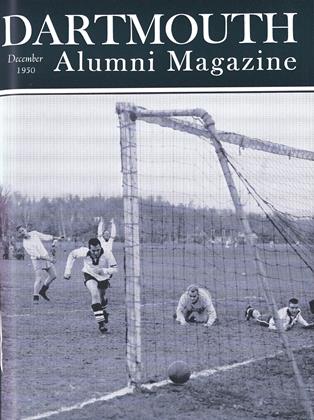Continuing its series of reprints of chapel talks delivered by President William Jewett Tucker between 1893 and 1909, the ALUMNI MAGAZINE this month combines portions of four talks on the same subject.
THE POWER OF A GREAT PURPOSE
LAST THURSDAY at a dinner of the Boston alumni a letter was read from Lord Dartmouth in which he signified his intention of coming soon to America and of depositing in the college library the correspondence between his ancestor, the Earl of Dartmouth, and Eleazar Wheelock concerning Dartmouth College. This correspondence will be of great value to us, since it will reveal the true purpose of Wheelock in founding the College.
Next year will be the 150 th anniversary of the founding of Moor's Charity School, from which sprang Dartmouth College. This College was possible when Eleazar Wheelock took the Berkeley Fellowship at Yale, when he began to teach the Indian boys—as soon, in fact, as he became clothed with a great purpose.
A purpose has something personal in it. With his idea and spirit of service, he turned toward service to the Indians. They appealed to him at the time, not from degradation, but from a certain nobility of character. He conceived a great purpose, and its conception lay in its greatness. He was carried along by a religious movement which had a more solemn conception of the character of God than that which is now held. In this atmosphere he conceived his life work and threw himself into it with all his power. He wrought it out in homely detail, but back of it all was his great purpose.
Any purpose or any man who bears such a purpose must have endurance. Wheelock suffered countless hardships and difficulties in the carrying out of his project, but he held firmly to his purpose, despising all obstacles. And indeed when we believe in something great, all our thoughts are centered on great objects. You cannot believe in a great thing and have little neighbors anywhere in your thoughts. A great purpose can never betray a man. You can trust yourselves to it and it will carry you on to something great even as it carried Eleazar Wheelock. He lived to see the embodiment of a purpose which he designed and carried out. You and I and the thousands who shall follow us may look upon this College as an example of what a man may accomplish when he casts his lot in with a great purpose and lets it bear him onward.
The power of holding fast to one's profession is the unknown power which determines the moral success or failure of most men. It is infinitely more than mere force or persistency. It has that fineness of moral power which comes from keeping a true and satisfying end in sight.
The possession of this power explains the fact that some men exceed their early promise. They get the reaction from a great purpose held to until it is realized. Gradually they build another self greater it may be than the original self by the force of consistent and cumulative action.
This power of holding fast to one's profession—to the purpose thrown out before him—gives unity to his nature by organizing all his powers; it gives him the courage of success; it creates within him a moral habit upon which he can rely in emergencies.
It is seldom that a personality comes and takes a man, or a cause says to a man, "Come." Rather, we are deciding in our calm moments. Commitment is a continuous act. If we start on the right course we are pretty sure to stay there. If a man gives himself to a true thing, that thing is sure to become more and more attractive. God will furnish opportunities just as fast as men will use them.
This is power. I am speaking to you about power and it is all I want to speak of. I do not want to think of you as weaklings. Power comes to a man when he flings himself out with faith and takes what faith always gives himan everlasting place among men.
We ought not to take any unnatural views of life. Suppose we take such a straight interpretation of life as that given by Gladstone: He inspired with the belief that life "is a great and noble calling, not a mean and grovelling thing." Everything depends on the way we look at things. We often fall below our ideals, we never rise above them.
A man guards his life in its surroundings—in college it is in the choice of fellowship. There are some out of whose company you come stronger, and there are others from whom you come and have to recover yourself. A man ought to commit himself to a purpose that will turn around and help him.
Suppose a man cannot commit himself to any definite, specific end; then let him draw on the loyalty of Christ. Any man who commits himself to this care may fall and fall again, but he is not deserted. I wish I could make this real to you—that when a man is in need he finds someone to assist who is abiding, because that Deliverer has led countless hosts to everlasting victory.
 View Full Issue
View Full Issue
More From This Issue
-
 Class Notes
Class Notes1918
December 1950 By ERNEST H. EARLEY, DONALD L. BARR, RICHARD A. HOLTON -
 Class Notes
Class Notes1935
December 1950 By HENRY R. BANKART JR., JOHN WALLACE, ROBERT w. NARAMORE -
 Class Notes
Class Notes1942
December 1950 By JAMES L. FARLEY, JOHN H. HARRIMAN, ADDISON L. WINSHIP II -
 Class Notes
Class Notes1923
December 1950 By TRUMAN T. METZEL, COLIN C. STEWART 3RD, LEON H. YOUNG JR -
 Class Notes
Class Notes1934
December 1950 By JOHN J. FOLEY, JOHN E. GILBERT, WILLIAM H. SCHERMAN -
 Article
ArticleContributions by Classes in the 1950 Alumni Fund Campaign
December 1950







